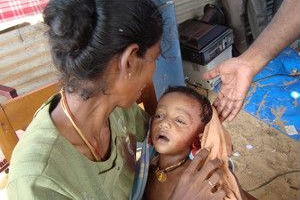
Ilankai Tamil Sangam
Association of Tamils of Sri Lanka in the USA
Published by Sangam.org
by Yolanda Foster, Amnesty International’s Sri Lanka researcher, May 17, 2011
|
This January, I met a teenage survivor from the war who had also turned to The Diary of Ann Frank for solace. She showed me the passage she had highlighted, an entry from 6th July 1944. It reads:
|
Civilians displaced during the closing days of the war, May 2009 ©Amnesty International
It’s now 2 years since the end of the war between the Sri Lankan security forces and the Tamil Tigers. To many, the Sri Lankan conflict may seem strangely remote. For survivors and those of us who monitored the abuses during the war, the month of May will never be quite the same.
I still remember the 19th May 2009 and the sense of shock and relief as the government announced the war was over. The relief was based on hope that finally the months of deprivation for trapped civilians living without adequate food and water and living in fear of shelling was at an end. The relief quickly ebbed when I realised the scale of denial.
In spite of a recent UN Panel report that has catalogued a series of violations, including government shelling of civilians, the government continues to repeat its absurd claims of a “No civilian casualty policy”.
This lie denies survivors their right to grieve properly. No official ceremonies have been held to lament large scale civilian deaths. Many families have not even received death certificates.
One of the things that shocked me most about the final months of the war was the way in which hospitals were repeatedly and systematically attacked. The shelling of the main hospital in the town of Puthukkudiyiruppu on 4 February 2009 was just one example of the way in which civilians were targeted and killed. The hospital, which had been subjected to several attacks in previous days, was bombarded by shelling for 16 hours.
In this period, I started to read biographies of other survivors of war seeking to understand how they sustained themselves. I found inspiration in The Diary of Ann Frank and did something I haven’t done since I was a teenager – wrote out a passage from her book and stuck it on my bedroom mirror.
On 8th July 1944 Ann writes:
“It’s really a wonder that I haven’t dropped my ideals because they seem so absurd and impossible to carry out. Yet, I keep them, because in spite of everything I still believe that people are really good at heart. I simply can’t build up my hopes on a foundation consisting of confusion, misery and death”.
This January, I met a teenage survivor from the war who had also turned to The Diary of Ann Frank for solace. She showed me the passage she had highlighted, an entry from 6th July 1944. It reads:
“It doesn’t matter (what) keeps people on the right path. It isn’t the fear of God but the upholding of one’s own honour and conscience”.
The young woman appealed to me and Amnesty International to stand by our principles of truth and justice and continue our call for an international investigation into what happened in those final months of the war.
The government’s response to the UN’s new report into the crimes committed two years ago has been to simply reject it outright. But the need for truth has never been stronger. Despite attempts to bury the truth there are credible reports that both sides committed gross abuses of human rights and international humanitarian law, including war crimes.
The UN must open an international investigation now to honour the survivors and the dead.
© 1996-2025 Ilankai Tamil Sangam, USA, Inc.